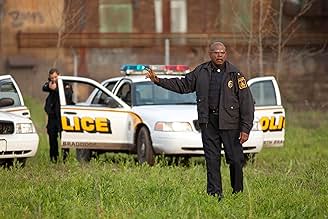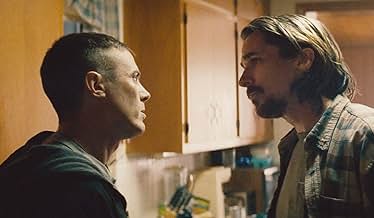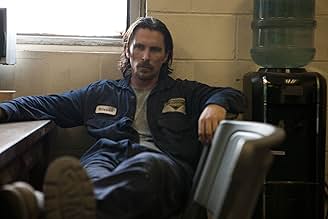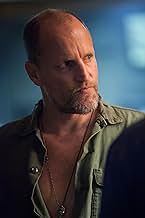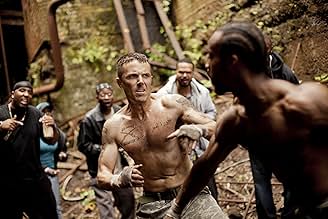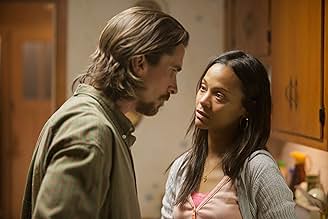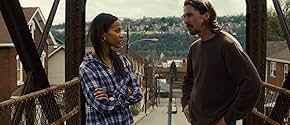Quando Rodney Baze desaparece misteriosamente e a polícia não age rápido, seu irmão mais velho, Russell, resolve o problema com as próprias mãos para encontrar justiça.Quando Rodney Baze desaparece misteriosamente e a polícia não age rápido, seu irmão mais velho, Russell, resolve o problema com as próprias mãos para encontrar justiça.Quando Rodney Baze desaparece misteriosamente e a polícia não age rápido, seu irmão mais velho, Russell, resolve o problema com as próprias mãos para encontrar justiça.
- Direção
- Roteiristas
- Artistas
- Prêmios
- 1 vitória e 10 indicações no total
Zoe Saldaña
- Lena Taylor
- (as Zoë Saldana)
Nancy Mosser
- Woman at Drive In
- (as Nancy Mosser Bailey)
- Direção
- Roteiristas
- Elenco e equipe completos
- Produção, bilheteria e muito mais no IMDbPro
Avaliações em destaque
This film is carried my the fabulous actors that starred in it. Having said that, it's worth watching. It could have been better but it's a good, down to earth flick.
When I saw the cast list, I knew there would be some wonderful performances, but I was surprised at how they uniformly surpassed my expectations. I believe it's Bale's best work so far, and that's saying something. Likewise with Affleck, Harrelson and Saldana. The rest of the cast was wonderful as well.
There is one scene in particular (I won't spoil it here) where an actor lets loose in a way that careful directors and nervous producers would normally edit out. I applaud Scott Cooper for breaking the rule that films are meant to entertain (and earn millions), and raw emotion that feels too close to reality is to be avoided. It's inelegant, and not what we want to see from stars, especially attractive ones. Cooper lets people be people, and I find that incredibly refreshing.
I was immediately invested in the characters -- warts and all. As painful as many of their decisions were to watch, I went along for those very bumpy rides, because any other course taken would be untrue for these characters.
I recently saw "12 Years A Slave," and feel inclined to mention that I sense a new, somewhat subversive style of filmmaking emerge -- and maybe a wonderful new culture in Hollywood. (At least I hope so.) It's one where films about extraordinary hardship are treated a way that doesn't hold back, glamorize or otherwise mollify them.
In my opinion, when Hollywood slicks up violence (as it almost always does), it informs us that we shouldn't really be moved by its tragedy. We aren't shaken to the core and inspired to stop suffering wherever we can. That's shameful. So kudos to Cooper and to Steve McQueen for embracing a reality in their films that reconnects us with humanity instead of suggesting it's okay to blithely mock it.
If I have any criticism of this film, it's that two scenes where one plays out as a metaphor for the other may not have been necessary. Otherwise, I feel the writing is disciplined and at the same time very rich and rewarding.
The potential horrors of poverty and a lack of opportunity on display in this film are dealt with in a way that exempts political bias, and that in itself is a huge accomplishment.
A sense of hope exists amidst the heartache of this film. I will see it again.
There is one scene in particular (I won't spoil it here) where an actor lets loose in a way that careful directors and nervous producers would normally edit out. I applaud Scott Cooper for breaking the rule that films are meant to entertain (and earn millions), and raw emotion that feels too close to reality is to be avoided. It's inelegant, and not what we want to see from stars, especially attractive ones. Cooper lets people be people, and I find that incredibly refreshing.
I was immediately invested in the characters -- warts and all. As painful as many of their decisions were to watch, I went along for those very bumpy rides, because any other course taken would be untrue for these characters.
I recently saw "12 Years A Slave," and feel inclined to mention that I sense a new, somewhat subversive style of filmmaking emerge -- and maybe a wonderful new culture in Hollywood. (At least I hope so.) It's one where films about extraordinary hardship are treated a way that doesn't hold back, glamorize or otherwise mollify them.
In my opinion, when Hollywood slicks up violence (as it almost always does), it informs us that we shouldn't really be moved by its tragedy. We aren't shaken to the core and inspired to stop suffering wherever we can. That's shameful. So kudos to Cooper and to Steve McQueen for embracing a reality in their films that reconnects us with humanity instead of suggesting it's okay to blithely mock it.
If I have any criticism of this film, it's that two scenes where one plays out as a metaphor for the other may not have been necessary. Otherwise, I feel the writing is disciplined and at the same time very rich and rewarding.
The potential horrors of poverty and a lack of opportunity on display in this film are dealt with in a way that exempts political bias, and that in itself is a huge accomplishment.
A sense of hope exists amidst the heartache of this film. I will see it again.
Weeks before I took the time to see Out of the Furnace on its opening day today, I saw an interview with the cast where star Christian Bale made a comment about how the script and the character really stuck with him before he'd ever agreed to take the role. While I normally hate to see a film based on something ANY of the actors involved have said (because really, who WOULDN'T give their film a nice push to the press?), I had a gut feeling I'd want to see this one. It's a good thing I tend to go with my gut, because if you watch for two hours with an open mind, Out of the Furnace is certainly filled with dilemmas people across America STILL face on a daily basis -- and that alone is why it will hit too close to home. It is why some people will say it is "too" gritty, "too" depressing, "too" much of something.
I'm a New Jersey native, and my state is filled with many towns that are run down and haven't seen anything positive happen in them in decades. A town not far from me lost its heart when a tea factory was forced out and jobs outsourced to China in the 90s. Just across the border, 20 minutes into Pennsylvania, is an old steel town (not the one in the film) that drove workers out of their mills in the 80s, the old blast furnaces still towering over the "south side" of town that is dotted with row homes. If you've ever driven through Michigan, at least a handful of cities there would paint the same picture as anything you'll see in Out of the Furnace. In Indiana, the same. I point this out because several moviegoers in the theater where I saw the film were saying that Out of the Furnace paints an unrealistic portrait of the "worst" parts of America, making them seem worse than they are. But until people have lived that lifestyle, it's easy to say that it doesn't still exist. What I appreciated about Furnace is that Cooper had the guts to make a gritty film that points out that there are towns filled with good people who can never get beyond their "hard times".
Is it unrealistic, perhaps, to assume that bare-knuckle fighting rings are organized nationwide? Perhaps. It doesn't mean, however, that there aren't plenty of illegal activities happening at the hands of "desperate" men (many of our nation's veterans are homeless, don't forget). Cooper chose Braddock as a great setting for this film, and he chose great actors to portray "everyman". And honestly, I see why he waited for Christian Bale to come around to making this film; nobody could have pulled off Russell Baze the way that Bale does -- with his quiet desperation, his eyes telling you everything that is churning in his gut, the weariness settled into his body making him sometimes appear aged beyond his years. Where Bale brings a quietness to Russell, Casey Affleck brings the loud emotive bursts and the scrappiness of his youth to Rodney Baze, and the two work wonderfully in balancing the "brotherhood" aspect of the film. While I fault Cooper for failing to tell us more of the relationship between the two, I feel that both actors worked hard to bring the familial bond to the forefront of the story.
There are several aspects to the storytelling that are to be admired. For one, the juxtaposition between Russell out hunting while his brother is being driven to what could potentially be his death match -- a "hunt" of his own -- was brilliant in its pacing. The same can be said for the scene where we assume the "bad" guy (Woody Harrelson taking a terrifying turn as the film's antagonist) is going to finally be caught by the law enforcement swarming his home. And finally, the bridge scene between Russell and Lena (Baze's girlfriend played admiringly well by Zoe Saldana) is one that gives a heart to a film that is otherwise dark and depressing. It's because of moments like these that I was able to overlook the film's obvious flaws. There is patchy storytelling (blame the script writers), but the actors all grab hold of the material they've been given and work well with it despite its shortcomings. What I ultimately applaud Out of the Furnace for is the fact that these characters could still represent many people in this country and throughout the world. How far would we ALL go, trying so hard to be "good" day in and day out, waiting for a break, trying to earn the extra dollar...before we got tired of the rest of the world getting ahead without us, and we take matters into our own hands?
Out of the Furnace poses this thought-provoking question and lets the viewer see how you can go down either path. Everyone wants to say that they'd still stay on the straight and narrow, but until you can put yourselves into the shows of these characters, you just truly never know. Ask yourself what you would do if Rodney Baze was YOUR brother? How far would you go for family -- for a family member who had put his own life on the line for this country? How far would you go in a town where everything else had shut down around you? Cooper doesn't give us the best film of the year with Out of the Furnace, but he and this cast give you plenty to think about long after the credits roll.
I'm a New Jersey native, and my state is filled with many towns that are run down and haven't seen anything positive happen in them in decades. A town not far from me lost its heart when a tea factory was forced out and jobs outsourced to China in the 90s. Just across the border, 20 minutes into Pennsylvania, is an old steel town (not the one in the film) that drove workers out of their mills in the 80s, the old blast furnaces still towering over the "south side" of town that is dotted with row homes. If you've ever driven through Michigan, at least a handful of cities there would paint the same picture as anything you'll see in Out of the Furnace. In Indiana, the same. I point this out because several moviegoers in the theater where I saw the film were saying that Out of the Furnace paints an unrealistic portrait of the "worst" parts of America, making them seem worse than they are. But until people have lived that lifestyle, it's easy to say that it doesn't still exist. What I appreciated about Furnace is that Cooper had the guts to make a gritty film that points out that there are towns filled with good people who can never get beyond their "hard times".
Is it unrealistic, perhaps, to assume that bare-knuckle fighting rings are organized nationwide? Perhaps. It doesn't mean, however, that there aren't plenty of illegal activities happening at the hands of "desperate" men (many of our nation's veterans are homeless, don't forget). Cooper chose Braddock as a great setting for this film, and he chose great actors to portray "everyman". And honestly, I see why he waited for Christian Bale to come around to making this film; nobody could have pulled off Russell Baze the way that Bale does -- with his quiet desperation, his eyes telling you everything that is churning in his gut, the weariness settled into his body making him sometimes appear aged beyond his years. Where Bale brings a quietness to Russell, Casey Affleck brings the loud emotive bursts and the scrappiness of his youth to Rodney Baze, and the two work wonderfully in balancing the "brotherhood" aspect of the film. While I fault Cooper for failing to tell us more of the relationship between the two, I feel that both actors worked hard to bring the familial bond to the forefront of the story.
There are several aspects to the storytelling that are to be admired. For one, the juxtaposition between Russell out hunting while his brother is being driven to what could potentially be his death match -- a "hunt" of his own -- was brilliant in its pacing. The same can be said for the scene where we assume the "bad" guy (Woody Harrelson taking a terrifying turn as the film's antagonist) is going to finally be caught by the law enforcement swarming his home. And finally, the bridge scene between Russell and Lena (Baze's girlfriend played admiringly well by Zoe Saldana) is one that gives a heart to a film that is otherwise dark and depressing. It's because of moments like these that I was able to overlook the film's obvious flaws. There is patchy storytelling (blame the script writers), but the actors all grab hold of the material they've been given and work well with it despite its shortcomings. What I ultimately applaud Out of the Furnace for is the fact that these characters could still represent many people in this country and throughout the world. How far would we ALL go, trying so hard to be "good" day in and day out, waiting for a break, trying to earn the extra dollar...before we got tired of the rest of the world getting ahead without us, and we take matters into our own hands?
Out of the Furnace poses this thought-provoking question and lets the viewer see how you can go down either path. Everyone wants to say that they'd still stay on the straight and narrow, but until you can put yourselves into the shows of these characters, you just truly never know. Ask yourself what you would do if Rodney Baze was YOUR brother? How far would you go for family -- for a family member who had put his own life on the line for this country? How far would you go in a town where everything else had shut down around you? Cooper doesn't give us the best film of the year with Out of the Furnace, but he and this cast give you plenty to think about long after the credits roll.
This is one among the finest movies i have ever seen. One of the best performances by Christian Bale, Casey Affleck, Woody Harrelson. A must watch. I don't know why it's so low rated.
Star studded cast, including one of the greats of this generation, Christian Bale. The acting is phenomenal. Harrelson always makes a great psycho. Scott Cooper is undeniably one of Hollywood's more distinguished directors of intense movies, and just as capable as anyone at evoking emotional power through a camera.
With all of that said, 'Out of the Furnace' has a slow, yet constant pace. It never has a moment where it really picks up. I believe this to be quite purposeful, as it emphasis the hopelessness and depression of both the characters and it's setting.
A good sense of realism though out the film. Nothing was too exaggerated, and was really quite believable.
With all of that said, 'Out of the Furnace' has a slow, yet constant pace. It never has a moment where it really picks up. I believe this to be quite purposeful, as it emphasis the hopelessness and depression of both the characters and it's setting.
A good sense of realism though out the film. Nothing was too exaggerated, and was really quite believable.
Você sabia?
- CuriosidadesAfter filming was completed, Woody Harrelson walked up to director Scott Cooper, hugged him and said "I have never wanted to shed a character so badly in my life".
- Erros de gravaçãoWhen Rodney fights in NJ and is knocked out, the other fighter jumps on him and keeps hitting the left side of Rodney's face. When Degroat comes in the back room following the fight, the right side of Rodney's face is most damaged. Apparently they just got the sides mixed up.
- Citações
Rodney Baze Jr.: I should have popped that motherfucker.
John Petty: That would be the last motherfucker you ever popped.
Rodney Baze Jr.: Am I supposed to be scared of him because he sucks on a lollipop?
- Cenas durante ou pós-créditosThis film shot entirely and proudly on Kodak Film
- ConexõesFeatured in The Tonight Show with Jay Leno: Episode #22.31 (2013)
- Trilhas sonorasRelease
Performed by Pearl Jam
Written by Eddie Vedder, Jeff Ament, Stone Gossard, Dave Krusen and Mike McCready
Courtesy of Epic Records
By arrangement with Sony Music Licensing
Principais escolhas
Faça login para avaliar e ver a lista de recomendações personalizadas
- How long is Out of the Furnace?Fornecido pela Alexa
Detalhes
- Data de lançamento
- Países de origem
- Centrais de atendimento oficiais
- Idioma
- Também conhecido como
- La ley del más fuerte
- Locações de filme
- Empresas de produção
- Consulte mais créditos da empresa na IMDbPro
Bilheteria
- Orçamento
- US$ 22.000.000 (estimativa)
- Faturamento bruto nos EUA e Canadá
- US$ 11.330.849
- Fim de semana de estreia nos EUA e Canadá
- US$ 5.220.288
- 8 de dez. de 2013
- Faturamento bruto mundial
- US$ 15.661.554
- Tempo de duração1 hora 56 minutos
- Cor
- Mixagem de som
- Proporção
- 2.39 : 1
Contribua para esta página
Sugerir uma alteração ou adicionar conteúdo ausente

Principal brecha
What was the official certification given to Tudo por Justiça (2013) in India?
Responda






